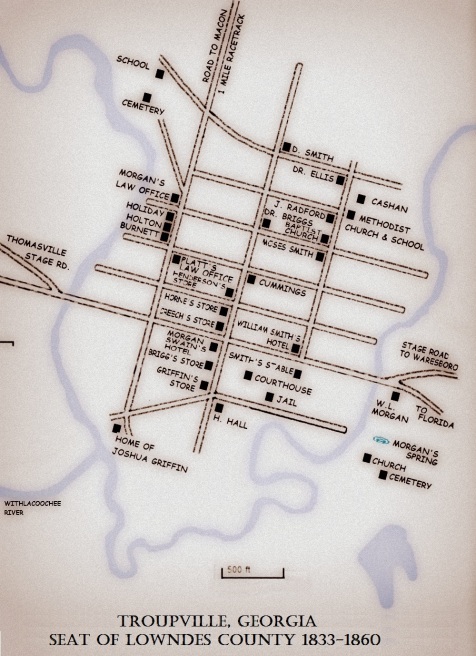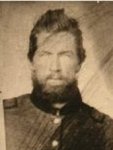Camp Townsend
In the fall of 1836, following a number of skirmishes between militia companies and bands of Creek Indians who were resisting relocation to western territories there was a call for support of federal troops to provide protection for settlers in Lowndes County. Companies of local militia under the command Levi J. Knight, Enoch Hall, Henry Blair, Henry S. Strickland, Samuel Swilley, Hamilton Sharpe, and others had fought engagements at William Parker’s place, Brushy Creek, Warrior Creek, Cow Creek, Troublesome Ford and other locales.
In response two companies of federal troops, about 200 men, under the command of Major Greenleaf Dearborn were assigned to Lowndes county. Detailed to provide medical services for Dearborn’s command was Army surgeon Dr. Jacob Rhett Motte. The Federal troops first took up position at Franklinville, GA, then county seat of Lowndes County. But after a few weeks relocated to a camp near the plantation of Thomas O. Townsend. Townsend later owned property and practiced law at Troupville, GA.

1837 map of the Florida-Georgia frontier showing locations of Franklinville, GA, Camp Townsend, Samuel Swilley’s place, Warners Ferry over the Withlacoochee River, Hickstown FL, San Pedro, FL
Camp Townsend was situated about ten miles south of Franklinville, GA.
Dr. Motte, Army surgeon, described the new bivouac at Camp Townsend:
The situation at Camp Townsend was not celebrated for many beauties and ecellencies to make it an object of peculiar attraction. It was in one of the most extensive and most barren of all the pine-barrens in Georgia, where nothing is to [be] seen but pine-trees and saw-palmetto. To the North it was sheltered by lofty pine-trees; to the East it looked upon an extensive forest of over-grown pine-trees, most charmingly variegated by pine-trees of a smaller growth. A fine grove of majestic and venerable pine-trees protected the camp from the sun (whose heat was now acceptable) towards the South; and to the West, the eye was carried along over a glittering and smiling quagmire, abounding in toads, and tadpoles, and the view [was] terminated by the towering and thickly growing trunks of pine-trees, whose numbers were doubly increased by reflection in the puddles which beautifully diversified the aforesaid quagmire. A tender air of repose pervaded the whole scene. The croaking of the thousand varieties of toads and tadpoles with which the quagmire abounded formed a concert of simple melody; the lowing of the cattle, which rove in native freedom through these woods, the grunting of the hogs who enjoy the same rural felicity; and the strokes of our men’s axes, partook of the softness of the scene, and fell tunefully upon the ear. Amidst such Elysian happiness my mind could not fail being disposed to gentle pleasures and tranquil enjoyments. The other senses also had their full share of delight; for I reveled in the good things of the land, which abounded with all manner of fish and flesh, and such like delightsome and wholesome excellencies. I slept on Buffaloe skin – sat on Bear skin – and fed on venison and wild-turkies, with an occasional sprinkling of squirrel.
With the onset of cooler weather, troops were assigned as woodsmen to keep the camp supplied with firewood.
“The constant felling of pine-trees for fuel was a source of much annoyance to me. From morning to night the strokes of the axe were constantly heard at my ears…It took six pine-trees of the largest size to make one campfire every night. It was made this way; the largest trees in the neighborhood were selected, generally from two to three feet in diamitor; these were cut into lengths of twelve feet, and then rolled up to the front of the tent, distant from it about ten or twelve fee; two smaller pieces are laid upon the ground perpendicular to these, and parallel to one another to serve as andirons, lying towards the tents; upon these other large logs are piled to a height of five or six feet. We each of us had a brobdignag comforter of this description in front of our tents, and as soon as the sun set they commenced blazing with the fierceness of so many volcanies.
As our camp consisted of twenty tents, each of which had a fire in front, the scene presented at night was awfully grand and magnificently comfortable. We burn’d such a large quantity of wood, that we cleared and used as fuel an acre per week of pine woods…
Rolling logs for Army campfires paralleled civilian events held to clear the land and as social events. In the fall of 1836 Dr. Motte and Major Thomas Staniford were invited to a Lowndes County log rolling .
We had been encamped near Townsend’s clearing about three weeks, when our neighbours began to be too troublesome for a longer proximity. They displayed too great an affection towards our men by supplying them with – a soldier’s greatest luxury – whiskey, – thereby injuring their morals and keeping them constantly in the guard-tent. The Major commanding [Major Greenleaf Dearborn] saw the evil, and concluded to get out of its way. He therefore issued his orders on Monday night the 13th November, that we should all be ready to march the following morning by sun-rise.
Related Posts
- Dr. Jacob Rhett Motte: Army Surgeon
- Dr. Motte Arrives at Franklinville, GA, 1836
- A Log Rolling in Old Lowndes County, GA
- Levi J. Knight’s 4th of July Address at Franklinville, GA 1835
- Lowndes County Seat Almost Sunk in 1827
- Old Land Mark Gone ~ Death Of “Uncle Billy” Smith
- Fourth of July, 1834 and the State Rights Association
- Pioneers of Old Lowndes Toasted State Rights and American Independence
- Riders of the Troupville Circuit: Tillman Dixon Peurifoy


